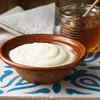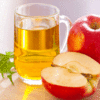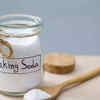
Do you scratch your head (quite literally) and wonder why it’s suddenly snowing flakes? Well, here’s the deal: dandruff happens when your scalp’s natural balance is off. A common fungus called Malassezia—which usually just chills harmlessly on your skin—can sometimes get a little too comfortable, especially if there’s extra oil around. This can irritate your scalp, leading to itchiness and those annoying flakes. Things like stress, cold weather, or the wrong hair products can make it worse.
1. Yogurt and Honey Mask

Yogurt and honey soothe scalp and fight dandruff naturally
Yogurt is rich in probiotics, which can help balance the scalp’s microbiome and inhibit the overgrowth of Malassezia. Honey, a natural humectant, has antibacterial and antifungal properties to combat inflammation and flakiness.
Ingredients:
1 cup plain yogurt (unsweetened, full-fat for best results).
2 tablespoons raw honey.
How to Use:
Mix the yogurt and honey into a smooth paste. Apply it directly to your scalp, focusing on the affected areas. Leave it on for 30 minutes before rinsing thoroughly with lukewarm water.
2. Apple Cider Vinegar Rinse

Apple cider vinegar restores pH and reduces fungal growth
Apple cider vinegar (ACV) is mildly acidic, with a pH around 2–3. This helps restore the scalp’s natural acidity (ideal pH: 4.5–5.5), creating an environment less hospitable to fungal overgrowth.
Ingredients:
1/2 cup apple cider vinegar.
1/2 cup water.
How to Use:
Mix equal parts vinegar and water. After shampooing, pour the mixture onto your scalp, massage gently, and leave it on for 5–10 minutes. Rinse thoroughly with cool water.
3. Coconut Oil and Lemon Juice

Coconut oil and lemon juice hydrate and exfoliate scalp
Coconut oil is a natural emollient that deeply moisturizes and contains lauric acid, a compound with antimicrobial properties. Lemon juice, high in citric acid, helps lower scalp pH and fight fungal growth.
Ingredients:
2 tablespoons virgin coconut oil.
1 tablespoon freshly squeezed lemon juice.
How to Use:
Warm the coconut oil slightly (it should be lukewarm, not hot) and mix it with lemon juice. Massage the mixture onto your scalp and leave it on for 20 minutes. Wash out with a gentle shampoo.
4. Aloe Vera and Tea Tree Oil Mask

Aloe vera and tea tree oil soothe inflammation effectively
Aloe vera contains polysaccharides and glycoproteins that reduce inflammation and promote healing, while tea tree oil is a proven antifungal and antimicrobial agent.
Ingredients:
2 tablespoons pure aloe vera gel (preferably fresh).
5 drops tea tree oil.
How to Use:
Combine aloe vera gel with tea tree oil and apply the mixture to your scalp. Allow it to sit for 30 minutes, then rinse with cool water.
5. Baking Soda and Olive Oil Scrub

Baking soda exfoliates, olive oil hydrates scalp thoroughly
Baking soda acts as a mild abrasive, helping to physically exfoliate flakes and unclog hair follicles. Olive oil, rich in antioxidants and fatty acids, hydrates the scalp and reduces oxidative stress.
Ingredients:
2 tablespoons baking soda.
1 tablespoon extra virgin olive oil.
How to Use:
Mix baking soda and olive oil into a paste. Gently massage it onto your scalp for 2–3 minutes, focusing on flaky areas. Leave it on for 10 minutes, then rinse thoroughly.
Bonus: How to Prevent Dandruff
To prevent dandruff, eat foods rich in zinc (nuts, seeds, eggs), B vitamins (whole grains, leafy greens), omega-3s (salmon, walnuts), and probiotics (yogurt, kimchi). These nutrients support scalp health and reduce inflammation. Wash your hair 2-3 times a week with a gentle shampoo, massaging your scalp to remove buildup. Avoid overwashing, heavy styling products, and hot water, as they can irritate your scalp. Keep it moisturized with lightweight oils if dry, and rinse thoroughly to prevent residue. Lastly, avoid scratching or wearing sweat-trapping hats to keep your scalp balanced and healthy.
 Do you scratch your head (quite literally) and wonder why it’s suddenly snowing flakes? Well, here’s the deal: dandruff happens when your scalp’s natural balance is off. A common fungus called Malassezia—which usually just chills harmlessly on your skin—can sometimes get a little too comfortable, especially if there’s extra oil around. This can irritate your scalp, leading to itchiness and those annoying flakes. Things like stress, cold weather, or the wrong hair products can make it worse.
Do you scratch your head (quite literally) and wonder why it’s suddenly snowing flakes? Well, here’s the deal: dandruff happens when your scalp’s natural balance is off. A common fungus called Malassezia—which usually just chills harmlessly on your skin—can sometimes get a little too comfortable, especially if there’s extra oil around. This can irritate your scalp, leading to itchiness and those annoying flakes. Things like stress, cold weather, or the wrong hair products can make it worse.




